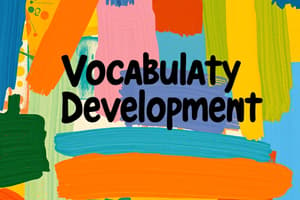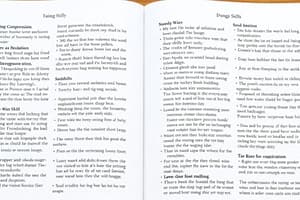Podcast
Questions and Answers
What is meant by receptive vocabulary?
What is meant by receptive vocabulary?
- Words learned through memorization techniques.
- Words that cannot be used in conversations.
- Words that are recognized and understood when reading or listening. (correct)
- Words used for writing and speaking.
Which strategy is NOT commonly used for vocabulary development?
Which strategy is NOT commonly used for vocabulary development?
- Using flashcards for active recall.
- Reading widely across various genres.
- Rote memorization of word lists. (correct)
- Engaging in games and activities.
What does morphological awareness help individuals do?
What does morphological awareness help individuals do?
- Memorize definitions of words.
- Ignore unfamiliar vocabulary in texts.
- Decode new vocabulary through understanding word structure. (correct)
- Recite poetry with correct pronunciation.
Which of the following best describes productive vocabulary?
Which of the following best describes productive vocabulary?
How can self-assessment tools aid vocabulary growth?
How can self-assessment tools aid vocabulary growth?
What role does technology play in vocabulary development?
What role does technology play in vocabulary development?
Why is encouraging lifelong vocabulary growth important?
Why is encouraging lifelong vocabulary growth important?
Which of the following methods is effective for learning words through context?
Which of the following methods is effective for learning words through context?
Study Notes
Vocabulary Development
-
Importance of Vocabulary
- Fundamental for effective communication.
- Enhances reading comprehension and writing skills.
- Aids in academic success and professional development.
-
Types of Vocabulary
- Receptive Vocabulary: Words recognized and understood when reading or listening.
- Productive Vocabulary: Words used in speaking and writing.
-
Strategies for Vocabulary Development
- Reading Widely: Exposure to diverse genres and subjects improves word knowledge.
- Contextual Learning: Understanding words through context rather than rote memorization.
- Word Mapping: Creating visual representations of words (definitions, synonyms, antonyms).
- Use of Flashcards: Engaging with words through active recall.
- Games and Activities: Incorporating fun methods like crossword puzzles and word searches.
-
Morphological Awareness
- Understanding the structure of words (roots, prefixes, suffixes) to decode new vocabulary.
- Encourages the ability to infer meanings of unfamiliar words.
-
Regular Practice
- Daily vocabulary exercises and quizzes.
- Writing prompts that encourage the use of new words.
-
Use of Technology
- Vocabulary-building apps and online resources.
- Digital flashcards and interactive games to reinforce learning.
-
Assessment and Reflection
- Self-assessment tools to track vocabulary growth.
- Reflecting on the usage of new words in daily conversations and writings.
-
Encouraging Lifelong Vocabulary Growth
- Cultivating a habit of learning new words regularly.
- Engaging in discussions and debates to apply vocabulary in real contexts.
Importance of Vocabulary
- Essential for effective communication, impacting clarity and expressiveness.
- Enhances reading comprehension, leading to improved interpretation and retention of information.
- Boosts writing skills, enabling stronger and more persuasive expression.
- Plays a critical role in academic success and career advancement.
Types of Vocabulary
- Receptive Vocabulary: Includes words that can be recognized and understood during reading or listening activities.
- Productive Vocabulary: Comprises words actively used in speaking and writing, demonstrating the ability to articulate thoughts.
Strategies for Vocabulary Development
- Reading Widely: Engaging with various genres and subjects deepens word knowledge and exposes learners to different contexts.
- Contextual Learning: Emphasizes understanding vocabulary through context rather than mere memorization, enhancing retention.
- Word Mapping: Visual strategies to map out words, including definitions, synonyms, and antonyms, aiding memorization and understanding.
- Use of Flashcards: Active recall through flashcards reinforces memory and boosts familiarity with terms.
- Games and Activities: Fun methods, like crossword puzzles and word searches, provide engaging ways to learn vocabulary while promoting enjoyment.
Morphological Awareness
- Involves understanding the structure of words, including roots, prefixes, and suffixes.
- Fosters the ability to deduce meanings of unfamiliar words by breaking them down.
Regular Practice
- Incorporates daily vocabulary exercises and quizzes to reinforce learning and retention.
- Writing prompts encourage the integration of new vocabulary into everyday use.
Use of Technology
- Vocabulary-building apps and online resources offer interactive and accessible learning tools.
- Digital flashcards and online games enhance engagement and promote effective study habits.
Assessment and Reflection
- Self-assessment tools help track vocabulary growth and identify areas for improvement.
- Reflecting on the usage of new words in daily conversations and writing can reinforce learning and demonstrate progress.
Encouraging Lifelong Vocabulary Growth
- Promotes the habit of regularly learning new words and exploring language.
- Engaging in discussions and debates allows application of vocabulary in real-life contexts, enhancing fluency and confidence.
Studying That Suits You
Use AI to generate personalized quizzes and flashcards to suit your learning preferences.
Description
Explore the essential strategies for vocabulary development that can enhance both communication and academic success. This quiz covers different types of vocabulary, effective learning methods, and the importance of morphological awareness. Improve your language skills and understanding through engaging techniques.




